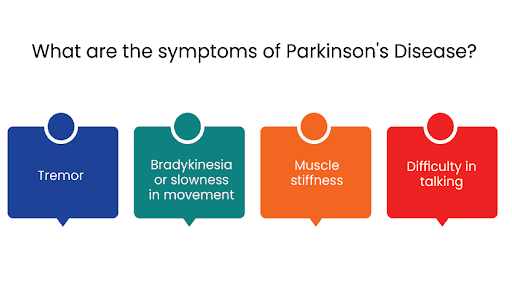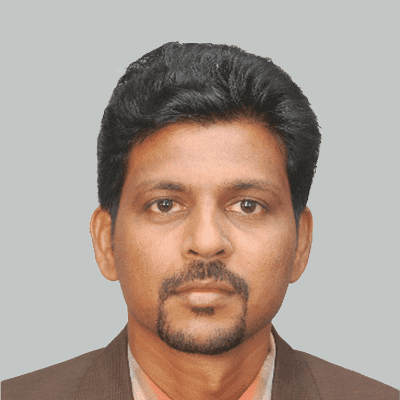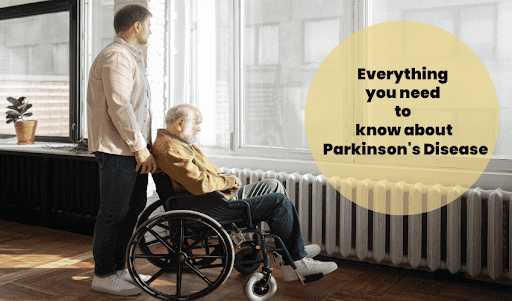Introduction
Parkinson’s Disease (P.D.) is a long-term degenerative disease involving the brain and the central nervous system. The motor system gets affected, which leads to difficulties in movement. The condition usually starts at 60, and the symptoms are mild initially but progress with age. The definite factor behind the development of the disease is unknown. Still, genetic and environmental factors combined with stress and lifestyle disorders play an essential role in Parkinson’s disease development.
Our Wellness Programs
What is Parkinson’s Disease?
The death of the nerve cells of the substantia nigra regions of the brain causes Parkinson’s disease. Though this brain region plays a vital role in controlling the movement of the limbs and body parts. Hence any damage to this part affects the activities of the limbs. Moves get slow and shaky, associated with tremors in one hand, stiffness of muscles and loss of balance. The condition worsens with age. Studies have revealed that damage to the nerve cells leads to a decrease in the production of the chemical dopamine. Low dopamine levels are the cause of the development of these symptoms.

Looking for services related to this subject? Get in touch with these experts today!!
Experts

Mansi Chawla

India
Psychologist
Experience: 12 years

Sapna Zarwal

India
Psychologist
Experience: 19 years

Davis Emerson

India
Psychologist
Experience: 6 years

Manveen Kaur

India
Psychologist
Experience: 9 years
What are the symptoms of Parkinson’s Disease?
The symptoms of Parkinson’s disease and their nature of progression usually vary from person to person. The signs and symptoms may be mild and go unnoticed during the disease’s early days. At first, the onset of the disease affects one side of the body with the tremors and shakiness of limbs. With the progression of the disease, even though both sides may be affected, the side affected first rapidly worsens.
The signs and symptoms commonly identified are:
- Tremor: Tremors are associated with the shaking of hands and fingers. Even during rest, your fingers may continue moving, shaking, and rolling against each other. This phenomenon is known as pill-rolling.
- Bradykinesia or slow movement is associated with difficulty in everyday movement and daily chores. Often simple walking becomes difficult as a result of the disease.
- Muscle stiffness: This is another movement-related issue which causes the muscles to become tight and rigid. Movement becomes painful and challenging in this condition.
- Lack of proper posture and muscular imbalance: With the disease advancement, you may lose your natural erect posture and balance.
- Loss of automatic movements: Natural activities like swallowing, smiling, blinking, and walking may become difficult due to muscular rigidity.
- Difficulty in talking: In advance cases, there is a complete loss of speech and talking ability due to loss of muscle coordination.
- Writing inability: It may become difficult to write, and your words may be small and difficult to read.
What are the causes of Parkinson’s Disease?
Though the exact causes for the development of Parkinson’s disease are yet unknown, doctors have cited several factors which might play an essential role in the development of the disease. Some of them are:
- Genetic factors: In cases with a familial inheritance, studies have revealed genetic mutations at different levels, which might be behind the development of the disease. Also, several researchers say that in cases where there has been no such familial inheritance, variations in the genes and the appearance of specific genetic markers have increased the risk of the disease. Hence, the medical fraternity accepts a genetic linkage to the disease.
- Environmental triggers: Certain environmental factors, such as toxins or viral proteins, may act as triggers for the disease. Research on ecological motivations is still at a very nascent stage.
- Presence of Lewy bodies: Lewy bodies are clumps of certain cell matters whose appearance is a sign of the development of the disease shortly.
- Alpha-synuclein protein: This protein found inside the Lewy bodies appears in a clumped form which the cells cannot break down. It is probably one of the factors for Parkinson’s disease. However, studies of this protein are underway.
What are the treatment options for Parkinson’s disease?
Treatment options for Parkinson’s disease may include:
- Medications: Carbidopa-Levodopa is the most effective and widely used medication for treating Parkinson’s. But due to associated side effects, it should be taken upon advice by a registered medical practitioner only.
- Surgery: In advanced cases, the neurosurgeon may recommend Deep Brain Stimulation.
- Physiotherapy: Physiotherapy is an excellent option to improve muscle strength and reduce muscular dystrophy. Often it shows remarkable results, and the affected person can perform their daily chores themselves.
- Speech therapy: In advanced cases with difficulty in speech, you should consult a speech therapist to improve communication and help the person express their needs.
How is Parkinson’s disease diagnosed?
No single confirmatory test exists for the diagnosis of Parkinson’s disease. However, a study of symptoms and diagnostic tests can confirm it. Experiencing the following signs and symptoms over a long period may indicate Parkinson’s Disease:
- Tremor and shaking of muscles
- Bradykinesia and slow muscle movement
- Muscular stiffness of the arms, legs and body
- Postural imbalance, uncontrolled falls
Imaging tests are not always instrumental in diagnosing Parkinson’s Disease. Nowadays, doctors perform a DaT Scan or Dopamine Transporter Scan. In this scan, they inject a small amount of radioactive drug or tracer into the bloodstream that binds with the dopamine secreting cells of the brain. Next, they take Images to draw inferences about the condition and density of the cells.
What research is going on, on Parkinson’s disease?
Scientists are researching to find a possible cure and relief for anybody affected by this condition. They have accepted the certainty of gene involvement and are working to understand the same further. Currently, research is going on the following areas:
- Use of stem cells in PD
- Gene therapy
- Search for P.D. biomarkers
- Experimental therapies
- Imaging and diagnosis
- Deep Brain Stimulation
- Cognitive aspects of P.D.
Conclusion
Every year thousands of people worldwide get affected by this condition. The degenerative nature of the disease destroys the quality of life as age progresses. It is detrimental to the person concerned and all those close to them, especially the immediate family members.
Medications like Levodopa improve conditions to a certain extent, but they too have their limitations and side effects. Overall the condition aggravates every day. An estimated 0.65 million people in India today are affected by Parkinson’s disease. Plenty of research is going on across the world to treat it. Researchers must discover medicines to cure the disease to the greatest extent possible. Improving the quality of life of affected individuals in rural and urban Indian populations is essential.
















